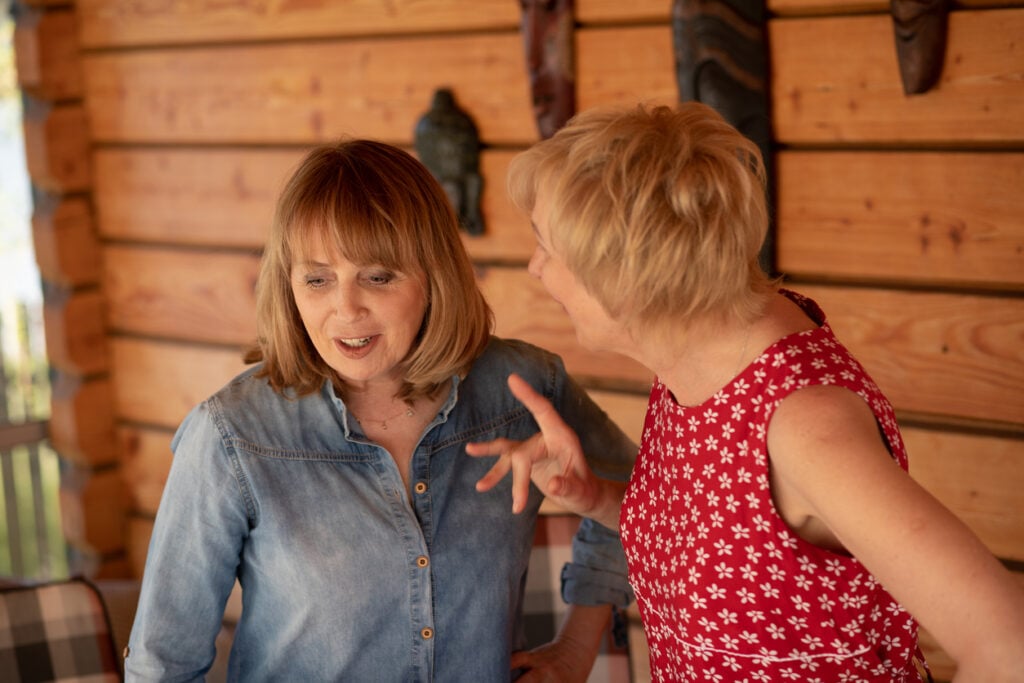Life is too short so embrace what matters and leave the rest behind.

When you enter your 50s, something fundamental shifts. It’s as if the fog finally lifts, and you can see life for what it really is. The people-pleasing, the chasing, the trying to prove something—all of it fades. Instead, you begin to crave peace, clarity, and authenticity. You stop being interested in the superficial and start to focus on the meaningful things that make your time on this earth feel truly well spent.
For many people over 50, that means setting firmer boundaries and letting go of the noise. It becomes easier to recognize what drains you and what gives you life. There’s less tolerance for anything that feels fake, exhausting, or misaligned. And rather than apologizing for those preferences, you begin to honor them. Here are 15 things that people over 50 simply won’t put up with anymore—and for good reason.
1. Listening to unsolicited advice about their lives

By the time people reach their 50s, they’ve accumulated decades of wisdom, experience, and insight. They’ve navigated countless challenges and made decisions that shaped their lives. Unsolicited advice can feel patronizing or dismissive, undermining the confidence they’ve earned over the years. Seniors often find themselves uninterested in entertaining opinions they didn’t ask for, particularly from those who don’t fully understand their unique circumstances, as shared on Irina Scarlat.
Instead of tolerating unwanted input, seniors prioritize their own judgment. They know what works for them and value advice that respects their autonomy and experience. By focusing on their inner wisdom, they maintain control over their choices and create space for meaningful conversations that enrich their lives rather than detract from them.
2. Wasting time on toxic relationships

Toxic relationships can sap energy and joy from anyone’s life, but for seniors, the impact feels even more pronounced. After 50, people often reassess their connections and decide to distance themselves from individuals who bring negativity, drama, or emotional strain, according to LiveBold and Bloom. Whether it’s an unkind friend, a critical family member, or a manipulative partner, they recognize the importance of prioritizing emotional well-being.
Instead of tolerating toxic dynamics, they focus on nurturing relationships that are positive, supportive, and reciprocal. This shift allows them to invest their time and energy in connections that bring happiness and fulfillment. By setting boundaries, they create a healthier social circle and a more peaceful life.
3. Putting up with rude customer service

After decades of being patient and understanding, seniors often draw the line at tolerating poor treatment in customer service situations. Whether it’s being ignored at a restaurant, spoken to rudely at a store, or brushed off when asking for help, they’re less likely to let such behavior slide. They understand their worth as customers and expect to be treated with courtesy and respect.
Seniors are also more likely to speak up when they experience subpar service, as mentioned in SME Today. They may leave reviews, ask to speak to a manager, or choose to take their business elsewhere. This isn’t about being demanding—it’s about valuing their time and insisting on basic respect.
4. Tolerating clutter and disorganization

Clutter can feel overwhelming at any age, but for seniors, it often represents unnecessary chaos and stress. After years of accumulating possessions, many people over 50 find that they crave simplicity and order. Decluttering becomes a way to create a peaceful environment where they can relax and enjoy their space.
Beyond physical tidiness, letting go of clutter also brings emotional and mental relief. Seniors often adopt a mindset of quality over quantity, choosing to keep only the items that bring joy or serve a clear purpose. This approach not only simplifies their living spaces but also creates a sense of clarity and focus in their daily lives.
5. Feeling obligated to attend every social event

Seniors often gain a deep appreciation for their time and energy, which makes them more selective about their social engagements. The days of feeling obligated to accept every invitation or attend every event are left behind. They prioritize activities that genuinely align with their interests and values, rather than spreading themselves too thin.
By focusing on quality over quantity, they can enjoy more meaningful interactions with loved ones. Whether it’s spending a quiet evening with close friends or engaging in a favorite hobby, this intentional approach to socializing helps them feel more fulfilled and less drained by unnecessary commitments.
6. Stressing over what others think of them

In their younger years, many people spend a significant amount of time and energy worrying about others’ opinions. By 50, however, seniors often realize that this anxiety is not only unproductive but also limiting. They’ve learned that they can’t control how others perceive them, so they focus instead on living authentically.
This newfound confidence allows seniors to embrace their true selves without fear of judgment. They make decisions based on their own happiness and priorities, rather than trying to meet external expectations. By letting go of this burden, they free themselves to live with greater joy and fulfillment.
7. Keeping up with technology they don’t need

While many seniors enjoy staying connected through technology, they draw the line at feeling pressured to keep up with every trend or gadget. They prioritize tools that genuinely improve their quality of life, such as smartphones for staying in touch with family or tablets for reading and streaming content.
This selective approach helps them avoid the frustration of navigating unnecessary complications. Instead of chasing every new app or device, they focus on mastering the tools that add value and convenience to their daily lives. It’s about making technology work for them—not the other way around.
8. Participating in endless small talk

Small talk often feels superficial, and for seniors, it can be a frustrating way to spend time. Many seniors prefer deeper, more meaningful conversations that foster genuine connections and intellectual engagement. Topics like personal growth, family, or shared experiences are far more appealing than weather updates or idle chatter.
This doesn’t mean they avoid casual conversations entirely. Instead, they steer interactions toward subjects that inspire or resonate with them. By focusing on quality discussions, they build stronger relationships and find more fulfillment in their social interactions.
9. Ignoring their health and well-being

Neglecting health isn’t an option as we get older. Seniors understand that small issues can quickly escalate if left unchecked, so they prioritize proactive care. This includes regular checkups, maintaining a balanced diet, and engaging in physical activity to keep their bodies and minds in optimal condition.
Beyond physical health, seniors also focus on mental and emotional well-being. They practice mindfulness, engage in hobbies they love, and seek out activities that bring joy. By taking care of themselves, they ensure they can continue to lead active and fulfilling lives.
10. Tolerating poor-quality products

After years of experience, seniors have learned the value of investing in quality over quantity. They’re no longer willing to settle for products that break, wear out quickly, or fail to meet their needs. Instead, they focus on finding items that are reliable, durable, and worth the cost.
This approach extends to every aspect of life, from household items to clothing and even food. By prioritizing quality, seniors avoid frustration and ensure that the things they own truly enhance their daily lives. It’s a simple yet powerful way to create a more satisfying lifestyle.
11. Getting caught up in unnecessary drama

Drama loses its appeal as people age, especially for seniors who value peace and stability. Petty arguments, workplace politics, and social conflicts are no longer worth the emotional toll they take. Instead, seniors focus on maintaining harmony and avoiding situations that bring stress or negativity.
By steering clear of spectacles, they can dedicate their energy to meaningful pursuits. This could mean nurturing relationships, exploring hobbies, or simply enjoying a quiet day. Letting go of unnecessary conflict allows them to live with greater clarity and contentment.
12. Saying yes to everything

Seniors often find freedom in learning to say no. In the past, they may have felt obligated to please everyone, leading to overcommitment and stress. Now, they recognize the importance of setting boundaries and prioritizing their own needs.
Saying no allows them to focus on what truly matters, whether it’s spending time with loved ones, pursuing hobbies, or simply relaxing. By being selective about their commitments, they create a life that feels intentional and balanced.
13. Engaging in meaningless routines

Repetition for its own sake no longer satisfies most seniors. They prefer to spend their time on activities that bring joy, purpose, and growth. Whether it’s shaking up a daily schedule or trying something new, they strive to make every moment count.
Breaking free from meaningless routines allows seniors to embrace new experiences and live with intention. They focus on creating a life that aligns with their passions and values, making their days more fulfilling and rewarding.
14. Enduring disrespect from younger generations

Respect is non-negotiable for seniors, who have spent decades building their lives and contributing to society. Disrespect from younger generations—whether it’s impatience, dismissiveness, or condescension—is something they no longer tolerate.
Instead, they advocate for mutual understanding and respect. They engage in conversations that foster connection while standing up for themselves when necessary. By asserting their value, seniors challenge ageism and set a positive example for others.
15. Ignoring their bucket list

After 50, many seniors feel a renewed urgency to pursue their dreams. They refuse to let fear or doubt hold them back from checking off their bucket list, whether that means traveling to new places, learning a skill, or tackling long-held goals.
This isn’t just about achieving milestones—it’s about living fully and creating unforgettable memories. By prioritizing their bucket list, seniors embrace life with courage and excitement, making the most of every moment.
